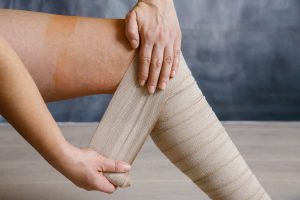 A venous ulcer is a wound that takes a longer time to heal than normal due to issues with blood flow to the heart from your extremities. This causes blood to pool in the legs and damages surrounding skin tissue; as a result, venous ulcers form, most often occurring on your legs near your ankles.
A venous ulcer is a wound that takes a longer time to heal than normal due to issues with blood flow to the heart from your extremities. This causes blood to pool in the legs and damages surrounding skin tissue; as a result, venous ulcers form, most often occurring on your legs near your ankles.
Venous ulcers may be identified based on their appearance, smell, and the sensations associated with them. Typically, these ulcers are shallow and irregularly shaped, and the skin around them may be hard and discolored. They also tend to ache and are typically itchy, foul-smelling, swollen, and oozing pus or other fluids.
The blood flow problems in your legs that cause venous ulcers to develop can occur due to a variety of factors, such as:
- Age
- Obesity
- Paralysis
- A sedentary lifestyle
- Smoking
- Surgery
- Prior injuries
You may also be more likely to develop venous ulcers due to conditions that affect the flow of blood from your legs, such as deep vein thrombosis, chronic venous insufficiency, high blood pressure, venous obstruction, and venous reflux. Additionally, your risk may be higher if any of these conditions have affected members of your family.
Venous ulcers can cause permanent damage to surrounding tissues without treatment. Your doctor may recommend a variety of treatment approaches, depending on the underlying medical problems that may have caused the ulcer to develop. Treatment may also involve several elements focused on the ulcer itself to relieve pain and prevent further tissue damage. Some of these elements may include:
- Antibiotics
- Bandages or stockings to improve blood flow and/or cover the wound
- Protective topical ointments
- Pain relief medication
- Debridement
- Daily cleaning of the wound
If you have developed a venous ulcer, you can receive high-quality treatment from the vascular surgeons at Jamaica Hospital Medical Center. To receive more information or to schedule an appointment, please call (718) 206-7001.
All content of this newsletter is intended for general information purposes only and is not intended or implied to be a substitute for professional medical advice, diagnosis or treatment. Please consult a medical professional before adopting any of the suggestions on this page. You must never disregard professional medical advice or delay seeking medical treatment based upon any content of this newsletter. PROMPTLY CONSULT YOUR PHYSICIAN OR CALL 911 IF YOU BELIEVE YOU HAVE A MEDICAL EMERGENCY.
